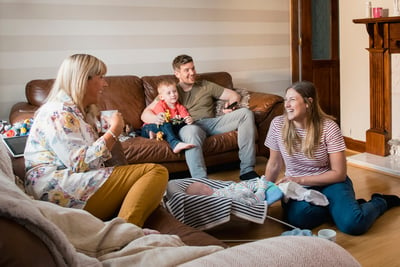
Everyone loves a new baby! But how do you visit a new baby safely in the hospital or at home, and make sure the new mom and baby stay happy and healthy? There are a few surprising things to consider that you may not think about, and we’ve compiled them below.
If you are the new mom (Congratulations!), we encourage you to share this blog with your friends and family prior to meeting your little one.
- What common courtesies should you always remember?
- Should you bring food or groceries? (YES!)
- What should you wear (or not wear)?
- How long should you stay?
- And more!
New Baby Visit Etiquette
 You’re eager to see the baby and congratulate the new parents, but it’s critical to be socially intelligent. You want to be helpful, not another responsibility.
You’re eager to see the baby and congratulate the new parents, but it’s critical to be socially intelligent. You want to be helpful, not another responsibility.
- Visits are invitation only. It’s not OK to just “drop by” at your convenience to either the hospital or the new family at home. Giving birth is an exhausting experience, and it takes time to recover. It’s OK to call, but if an invitation to visit doesn’t come right away, don’t be offended. Yes, they love you, but they may not be ready for a visit. Remember: It’s not about you. Let them know you understand if they’re not ready for a visit, and offer to call in a week or so and see how everyone is feeling.
- Call before you go. Be sure to ask if there’s anything you can pick up from the store before you arrive.
- Know when to leave. Don’t stay too long. Pay attention to cues that the mother is tired and try not to overstay your welcome.
- Bring food. An exhausted family with a new baby hardly has time to do anything, much less cook. Bring easy-to-reheat dishes that cater to tastes and allergies. Bring treats for mom and siblings, too! If cooking isn’t your thing, gift cards for restaurants that deliver or delivery services are another great option to consider.
The Moreland Cookbook is filled with favorite recipes from the Moreland OB-GYN team, including easy-to-make, healthy recipes. There are recipes for every meal of the day and vegetarian options are included. Click the link above to check it out!
- Be helpful. Ask what you can do to help. Don’t just do something because you think it’s helpful. You can offer to do the following:

- Hold the baby so that mom can nap or grab a shower.
- Help with pet care—walk the dog, clean the litter box, clean the birdcage.
- If there are other children in the house, offer to play with them.
- Ask if there’s something you can do to help, like household chores—without giving the idea that you think things are messy.
- Ask thoughtful questions. You have the best of intentions, but new moms can be sensitive and may perceive the questions you're asking as judgmental without you even realizing it.
- Don’t ask: “Are you breastfeeding?" Try: “He/She looks healthy!"
-
- Don’t ask: “Is he sleeping through the night yet?" Try: “I remember how tired I was after I gave birth (or I have heard giving birth is very exhausting). Let me know if you want to take a nap!"
-
- Don’t ask: “Did you get an epidural?" Try: “Do you feel like talking about your labor at all?"
- Don’t ask: “Don’t you love being a mom?" Try: “How are you feeling?"
- Don’t ask: “Did you get an epidural?" Try: “Do you feel like talking about your labor at all?"
- Don’t comment on her parenting choices. This isn’t the time for unsolicited advice, no matter how much you may know or have an opinion on a matter.
- So many decisions are personal. Things like how the baby is being fed, whether or not the baby was circumcised, or the parents’ decision to go back to work or stay home are none of your business, so we suggest not to comment unless you’re asked for advice.
- Don’t bring your kids. Even if they are not sick, kids can carry germs and can be rowdy which is hardly restful for a new mom or baby. Save those types of visits for when your children are specifically invited or when the baby is older, and then ask if it’s OK.
- Don’t assume you can hold the baby. The postpartum time is incredibly essential for both mother and baby for bonding, healing, nursing, and more. They may not want to be separated. New mothers can be sensitive and may be concerned with germs. Wait until the mother asks if you want to hold the baby and if so, wash your hands before you do.
- If you do hold the baby…

- Wash your hands first.
- Always hold the head and keep safety in mind.
- Use both hands and arms.
- Never hold a hot drink.
- If you wear jewelry of any kind, kindly remove it.
- Keep your hair out of reach from the baby.
- Avoid letting the baby touch your face.
- Don’t try to take a selfie.
- Do not kiss the baby. Mouths carry a lot of germs.
- If the baby starts to cry, hand the baby back to a parent.
- Don’t post pictures to social media without asking. If it’s not your baby, it’s not your news to share.
- Silence your phone. Getting a call or the ping of text messages can be startling for the baby.
Keeping Mother and Baby Healthy
It could be flu season, or it could be a beautiful summer day, but there are important health protocols to follow with a newborn.
General Tips
- Don’t visit when you’re sick. This means no runny noses, no coughing, and make sure you don’t have any contagious skin conditions, like poison ivy.
- If you’ve had a cold or any other illness, wait at least a week after you’ve recovered before visiting.
- If you’ve been exposed to someone with a contagious illness, wait at least two weeks before visiting.
- Be clean. Shower, don’t smoke, don’t wear perfume, and wash your hands immediately upon arrival.
- Dress properly and remove outerwear. You never know what outside pollution or germs you can bring in.
- Do not kiss the baby. This is mentioned above but bears repeating. As much as you want to, do not kiss the baby.
Vaccinations

There are common protocols that doctors recommend for anyone coming in contact with a newborn:
- You should confirm you are up-to-date with your whooping cough (pertussis) vaccination. Whooping cough is a very dangerous infection for a young baby—children under the age of 3 months are the most vulnerable to illness.
When newborn babies become very sick with whooping cough, there are a limited number of treatments, and they can be invasive. The vaccine is combined with tetanus and diphtheria vaccines. The formulation is called Tdap and is available from your doctor. - Get the annual flu vaccine at least two weeks before your visit. The last thing you want to do is give the parents or the baby the flu.
It’s important to note that the flu is more dangerous than the common cold for children. Every year, millions of children get sick with seasonal flu. Do your part and make sure you get your flu shot before you plan a visit.
If you have any doubts about what precautions you should take before visiting mom and baby, consult your doctor.
Have a Great Visit
These tips may seem simple and reliant on common sense, but in the excitement of the moment, it can be easy to forget how to keep both mother and child healthy, safe, and feeling loved.
We hope you’ve found these tips helpful. The providers at Moreland OB-GYN are dedicated to providing women with compassionate OB-GYN care throughout life. This includes complete obstetrical care, gynecology, gynecologic and obstetric surgery, fertility services, preventive health care, and more.
Learn more about our services, and contact us online to request an appointment.









